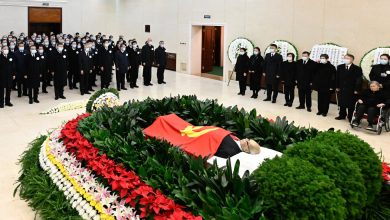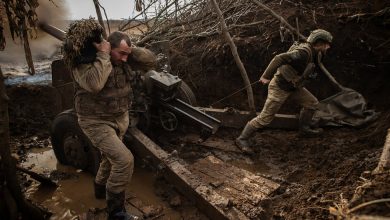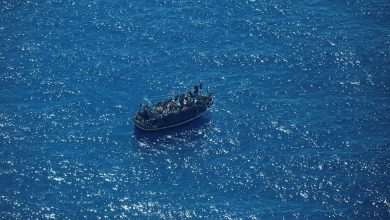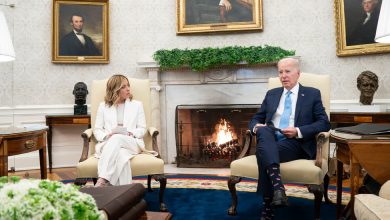Your Thursday Briefing

Good morning. We’re covering NATO’s intensifying defense, the Taliban’s abrupt reversal on girls’ education and Julian Assange’s prison marriage.

Canadian soldiers on their way to Latvia as NATO strengthens its presence in Central and Eastern Europe.Credit…Jacques Boissinot/The Canadian Press, via Associated Press
Amid talks, NATO bolsters its defenses
NATO announced on Wednesday that it would double its military presence on its eastern front. The additional four combat-ready, battalion-size units were deploying in Bulgaria, Hungary, Romania and Slovakia.
President Biden arrived in Brussels for an extraordinary strategy session, where he will press European allies for even more aggressive sanctions on Russia. Here’s the latest.
But Europeans feel the impact of sanctions and the war more acutely than Americans, and NATO members are trying to defend Ukraine without directly engaging with Russia.
European leaders may be especially unwilling to follow the U.S. in stopping purchases of Russian oil and gas: The E.U., on average, gets 40 percent of its natural gas and a quarter of its oil from Russia. Chancellor Olaf Scholz of Germany, which has the largest economy in Europe, said halting such purchases would imperil “hundreds of thousands of jobs.”
Escalation: The U.S. is quietly making contingency plans in case President Vladimir Putin unleashes Russia’s stockpiles of chemical, biological or nuclear weapons. Even without extreme weapons, Russia has all but obliterated everyday civilian life in Ukraine.
Dissent: Anatoly Chubais, Russia’s climate envoy, became the most senior government official to step down, reportedly to protest the war.
State of the war:
-
The latest Western intelligence reports indicate that Russian forces remain stalled. A senior NATO official said around 15,000 Russian soldiers might have died, more than double the Pentagon’s figure of around 7,000.
-
Kyiv: Rockets hit a residential area, causing heavy damage on Wednesday morning. But Ukrainian forces are pushing back, and the mayor said the embattled suburb of Irpin was back under Ukrainian control.
-
Makariv: The strategic town outside Kyiv is still in play. The Times’s Visual Investigations team analyzed dozens of battlefield radio transmissions between Russian forces, revealing logistical problems and communication failures.
-
Oksana Baulina, a Russian journalist who wrote about corruption in her native country, was killed in an attack in Kyiv on Wednesday.
Other updates:
-
On Wednesday, the U.S. government formally concluded that Russian forces had committed war crimes in Ukraine.
-
The French car company Renault has halted its operations in Russia.
-
Wary of how Russia might react, Israel rejected requests from Ukraine and Estonia to purchase and use Pegasus, a powerful spyware tool.
-
Russia’s invasion has shown Germany — which swiftly began its biggest rearmament program since the end of the Cold War — to be a weak link in NATO.
-
Denys Karachevtsev, a cellist, played Bach in the ruined streets of Kharkiv, his hometown.
Taliban reneges on girls’ schools
In an abrupt reversal, the Taliban said girls’ high schools in Afghanistan would remain closed until officials could assure their accordance with Islamic law, saying that female teachers and a religious uniform were needed. Girls’ schools were supposed to open this week.
Wednesday’s reversal is a significant blow to the Taliban’s international credibility: The move came a little more than a week before the U.N. had hoped donor countries would commit to more humanitarian aid to Afghanistan.
It could also threaten that funding. The international community has made girls’ education a central condition of foreign funding and any future recognition of the Taliban.
Context: Afghanistan is grappling with an economic collapse that has left over half of the population without sufficient food.
Details: Over one million girls had planned to return to class on Wednesday. Some did, only to be forced to go back home. “They came to my office, crying,” a principal in Kabul said.
Julian Assange marries in prison
The WikiLeaks founder wed Stella Moris, his longtime partner with whom he has two young children, at the London prison where he has been held since 2019. Supporters of the couple were encouraged to attend a “solidarity vigil” outside the facility, Belmarsh Prison.
It was not immediately clear who attended the ceremony, or if the couple was allowed to hold a reception or spend time alone afterward.
Background: Assange is fighting extradition to the United States on espionage charges. After years of court battles, Britain’s Supreme Court refused his latest appeal to prevent his extradition.
Details: In an essay in The Guardian that was published on Wednesday, Moris wrote that every aspect of the private ceremony was being intensely policed. WikiLeaks posted footage on Twitter of Moris after the ceremony.
THE LATEST NEWS
Around the World
-
Rescuers found a flight recorder from the Boeing 737 plane that crashed in southern China with more than 130 people onboard, but officials have provided few other details.
-
A Dutch publisher will halt publication of “The Betrayal of Anne Frank,” a dramatic best seller, after historians cast doubt on its conclusions.
-
China mandated a 30-day “cooling off” period for divorcing couples. Now, divorces are down, but marriages are, too.
Coronavirus
-
Spain will end its seven-day mandatory isolation period next week for infected people who have no or mild symptoms.
-
Greece will suspend the 100-euro-a-month fine it imposed on unvaccinated adults 60 or older.
-
South Korea asked crematories and funeral homes to increase their capacity amid a deadly surge.
-
Scientists expected the coronavirus to devastate Africa, but many low-income countries there fared better than wealthy ones.
What Else Is Happening
-
Judge Ketanji Brown Jackson pushed back on Republican senators’ suggestions that she was soft on crime and held extreme views on racial issues.
-
A brain implant allowed a man in a fully locked-in state to communicate in complete sentences, using only his thoughts.
A Morning Read
Deep in the jungles of Belize, the skeletons of people who died as long as 9,600 years ago have been exceptionally well preserved. Their bones offer a rare glimpse into the genetic history of people in the Maya region, suggesting that intensive maize farming and agricultural technology arrived from the south.
Lives Lived: Madeleine Albright, the first woman to serve as U.S. secretary of state, rose to power and fame as a brilliant analyst of world affairs. She died at 84.
Russia-Ukraine War: Key Developments
A new diplomatic push. President Biden is planning to announce new sanctions against Russia during his trip to Brussels, where he will meet with NATO allies and the European Union.
Russia’s shrinking force. The Pentagon said that Russia’s “combat power” in Ukraine has dipped below 90 percent of its original force. Western intelligence reports and military analyses indicate that Russian forces remain stalled across much of the Ukrainian battlefield.
NATO deployment. NATO’s chief, Jens Stoltenberg, said that the alliance would double the number of battlegroups in its eastern flank by deploying four new battlegroups in Bulgaria, Hungary, Romania and Slovakia, a significant bolstering of NATO’s presence in the region.
ARTS AND IDEAS
‘OK, Doomer’
As awareness about the climate crisis grows, so does a mounting sense of dread, especially among the young. Last year, a survey of 10,000 teenagers and young adults in 10 countries found that three-quarters were frightened of the future.
But although there is a lot of gloom, a growing number of young people are actively pushing to eschew doom.
Instead, they are confronting looming climate devastation by focusing on solutions, fighting the notion that it’s too late to turn things around. They believe that focusing solely on terrible climate news can sow dread and paralysis — and help preserve a status quo reliant on consumerism and fossil fuels.
“‘It’s too late’ means ‘I don’t have to do anything, and the responsibility is off me, and I can continue existing however I want,’” one podcaster said.
PLAY, WATCH, EAT, LISTEN
What to Cook
Conchas, the Mexican sweet bread, are a seashell-shaped delight.
What to Read
“Truly, Madly” explores the glamorous, turbulent and emotionally taxing relationship between Vivien Leigh and Laurence Olivier.
What to Listen to
Friends and collaborators: Christine and the Queens, Charli XCX and Caroline Polachek teamed up on a new pop track.
Now Time to Play
Play today’s Mini Crossword, and a clue: Forever and ever (four letters).
Here’s today’s Wordle and the Spelling Bee.
You can find all our puzzles here.
That’s it for today’s briefing. Thanks for joining me. — Amelia
P.S. Steven Lee Myers, a longtime foreign correspondent at The Times, is moving back to the U.S. to cover misinformation.
The latest episode of “The Daily” is about the Supreme Court confirmation hearings.
You can reach Amelia and the team at [email protected].





